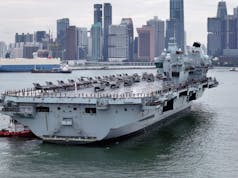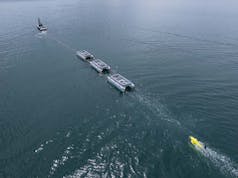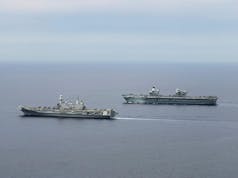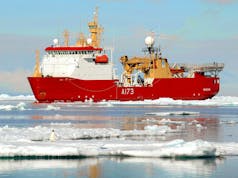British shipyard Cammell Laird will today announce at the Nor Shipping trade fair in Oslo plans for a new specially designed Ro-Pax ferry.
Liverpool City Region based Cammell Laird is releasing a sneak picture preview, see attached, of the commercial sensitive design ahead of a formal launch later this year and will be briefing prospective customers on the design at its stand.
Cammell Laird’s project director Andy Askham said the company believes its innovative, environmentally ground-breaking design will prove attractive to an ‘underserved market’.
“The ferry industry is crying out for innovation and green-friendly solutions,” he said.
“Our new Ro-Pax design will be in the segment of the market where there’ll be a lot of demand for the next decade. From our discussions with various owners we have seen real interest in our design that thrusts environmental innovation, fuel efficiency and comfort to the forefront of the future ferry market. The global ferry fleet is aging and in need of replacing while ferry building supply, certainly at a sophisticated level, is stretched in Europe in terms of spare capacity.”
Mr Askham said Cammell Laird will be marketing the Ro-Pax design based on its extensive experience and pedigree in the ferry market dating back decades.
“Owners have a degree of confidence in Cammell Laird following a series of new build jobs we have undertaken for the likes of Red Funnel and Western Ferries,” he said.
“The Red Kestrel freight ferry we built this year for Red Funnel is a strong example of how Cammell Laird can build to a bespoke design. In addition, we are currently building the RRS Sir David Attenborough Polar Research ship, one of the most advanced vessels of its kind ever built. This showcases the incredible skills and expertise we have in the shipyard – and we won this ship and the Red Kestrel contract against fierce international competition. Cammell Laird can further demonstrate its expertise through the drydocking and repairs we undertake for many ferries each year for a wide variety of customers including Stena, P & O, Seatruck Ferries, Irish Ferries, Mersey Ferries, Calmac and the Isle of Man Steam Packet Company. We know the ferry market extremely well and believe it is ripe for a genuinely attractive new vessel design offering the most modern features.”
Mr Askham said Cammell Laird is working on the design now with an international design house ahead of the formal launch in planned for later this year.













Well done Cammell laird. Commercial shipping come back? Are the M O D watching?
It’d be nice to think that the MOD put their two pennath worth in as to compatibility with troop transport.
What refreshing news, lately. No need for UK shipyards to hang onto a thread awaiting purely military handouts from the government; herewith obtaining cutting edge experience in the commercial field, to a time and price naturally, which will only strengthen bidding capability for all types of contract. A virtuous circle evidently in keeping with the NSS.
Why can most other EU country’s build huge ships and make money but we can’t? We used to be the best and biggest shipbuilders!..We need to keep large ship building alive in the UK despite what the Gov are trying to do to destroy it.
It is bizarre Cam. Some posters here say it is an ideology and I can only think they are correct. For some reason successive UK governments will not prioritise British industry.
@Daniele Mandelli – You are right and it goes back many years. In the rail industry Richard Ford (Captain Deltic) refers often to the belief that in BR minds a product got better the bigger the square root of the distance from London. Or rather Derby.
We can see glaring examples of this even over the last few years with Siemens landing the biggest train order ever in a totally Government run contract while jobs in Derby were in the balance and all built in Germany and Poland. And then when they DID say ‘build here’ to Hitachi with another huge order what did Hitachi do? They failed to make the welding technology available here as promised and then built everything outside that core contract in Japan and Italy where they DID make that investment. CAF of Spain and Stadler of Switzerland (and Austria and Poland) have benefited massively from this same attitude and now it isn’t just in the civil service it has spread because the Governments of all persuasions failed to lay down a golden rule: Build everything here or no orders. Although of course they couldn’t do that because of EU laws and guess who benefits?
In fairness CAF are building a new factory ‘for later orders’… if they come.
Well the explanation used to be that our unionisation of the industry made it unprofitable. Whether or not that’s still true I don’t know.
@JohnH – I can only say what my personal experience was in the ’60s and ’70s where I saw my industry (an engineering one where I did a 5 year apprenticeship to get my C & G Tech Cert and HND) gradually destroyed by Union power in the hands of what we would now call communists. Its why I made a major decision and changed career but thats another story.
I believe this happened especially in heavy engineering where we led the world and which was targeted by those unions because of its importance. So its impact was seriously felt and the closure of many shipyards, heavy engineering companies, steel mills and even locomotive companies despite the best efforts of BR tells the tale.
What followed in the ’80s and ’90s as a reaction was piss poor management, lack of interest by commercial investors because the risks were too high and the upsurge in foreign (mainly low wage Asian) competition which altogether killed off complete industries like the UK car industry. Again once a world leader.
Memories are long and while we no longer have industrial relations problems and one of the lowest strike rates in Europe (except for the railways) we lost credibility ground to foreign competition with commercial customers. The lack of investment by successive UK Governments in Naval shipping and the inbred desire NOT to buy anything in the UK within our Civil service just adds doubt to concern and creates further lack of success.
But well done CL and I admire the positive outlook …
Chris, I fully agree with your comments. The ideology of the civil service of not buying British has carried over to the military and DE&S in particular. In that all in-depth servicing of vehicles, ships and aircraft is now done by industry, as that’s seen to be cheaper.
What this has done has led to a massive skills fade within the engineering branches and destroyed any flexibility that was previously possible. The favourite phrase today is “it’s out of scope” which means we have to pay shed loads to either amend the existing contract or pay for new one.
The problem now is that because we have used contracting so much and for so long now, the newer generation of project managers and officers do know any different. They cannot see the benefits of keeping some of the work in service. A good example is the speed at which prototypes or modifications can be developed and implemented. The other benefit being the free training that military engineering brings to companies when these people leave the service and bring their skills.
I really do hope that soon there will be an ideology change, where the powers that be really start believing in their country, rather than preaching about it from the soap box and looking good on TV!
Chris H. Your experience as a n apprentice was similar to mine. I would debate that the UK car industry was a world leader, we had a captive market and once globalisation took hold and we had access to Japanese and German cars we just realised as consumers the were better products. Complacency meant we didn’t react to the challenge. As for ship building other than the RFA tankers what contract has the government put overseas? I don’t recall any others. And as I recall no UK yard bid. If they UK government has only evered order 3 ships from outside the UK its done all it can to support the industry. Alternatively should the government have subsidised foreign orders or orders from private companies? If so what make shipbuilding so special? Cammel Laird are looking successful, why because its not relying on the government for over priced orders instead look at how it can be efficient and compete.
@Expat – My point about how the UK car industry WAS a global leader was based on fact and we (from different perspectives) actually agree. I blamed piss poor management which you interpret as lack of investment. 2 sides of the same coin IMHO.
You singled out tankers but my general point was about the clear preference by the Civil Service for anything as long as its not British built. And I gave some wide examples. Those 4 tankers and the 3 FSS ships should have been and should be built here. Its UK taxpayers money and the UK economy, workforce and young people should be the beneficiaries of that money not a bunch of foreigners. How people spend their private money is up to them but this is taxpayer’s money and must be spent here.
Want another example? The UK MoD is buying 2,700 OshKosh vehicles worth £1.1 Bn for the Army. They should have demanded they be built here. But they have form here: The same MoD bought 5,000 trucks from MAN in Germany(worth £1 Bn of taxpayer’s money) ahead of the UK based LDV consortium and a third bidder, the US truck manufacturer Oshkosh, which had pledged to carry out 90 per cent of the work in the UK, creating 600 jobs at its Llantrisant site in South Wales. Oshkosh ARE prepared to build here but they were never asked to build those 2,700 trucks here. Those MAN trucks should have been built here. And trust me I know a bit about that as I was a chargehand at MAN and there was nothing special about them at all and what people never saw was the correction work we carried out.
And I don’t buy the argument that if we do pay a higher ‘Price’ to a UK shipbuilder that means it is a ‘subsidy’. It can’t be as the ‘Nett Cost’ is lower than buying abroad.
Without a doubt unionisation played some part in the downfall of British shipbuilding directly and indirectly. Govt had a major part to play as under a certain Mrs T unions were the big enemy. It also did not help the govt claimed “EU” rules would not let them support shipbuilding while ignoring what the Germans and others we doing to help their won industries.
Still back to the topic here it s good to see my old yard on the up, though it was in Birkenhead in my day and not the “Liverpool City Region”
Agree those sentiments, especially the last sentence. Good to see there are other ex Lairds people on this forum. I also remember when it was Birkenhead, and Grayson Rollo & Clover, and East Float, West Float, Bidston Dock werer all thriving. Oh well….
I’m sure some recall the article about Littoral Strike Ships back in February. The US has similar ships which based on converted Ro-Ro ferries. I’m wondering if this new CL design could be the basis for the UKs LSS.
https://ukdefencejournal.org.uk/uk-to-purchase-two-littoral-strike-ships-for-special-forces/